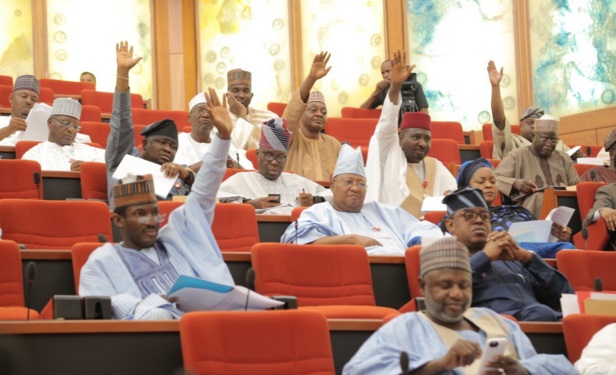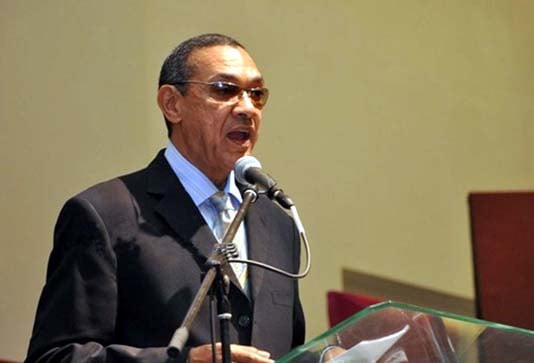BY VINCENT OKWECHIME
Section 147(3), which speaks to the need to appoint a minister from each state of the federation, serves one major purpose. It reinforces Section 14(3) in terms of ensuring that the federal character of Nigeria is reflected in the appointment of ministers. Accordingly, it enjoins the president to ensure that a minister is appointed from each state of the federation.
Is it mandatory for the president to do so? Yes! But only to ‘admonish’ that his appointments cannot be skewed in favour of one state or a set of states. And only to the extent that he has enough ministries to absorb an indigene of each state. It also means that if he has 36 ministries, it is desirable that he appoint(s) a minister from each state.
What it does not say is the number of ministries to be established nor the number of ministers to be appointed in relation to the number of ministries (to be) established.
For me, this is the point of departure. Back to this later.
Advertisement
What, then, does the provision contemplate or require of the president? It simply reinforces Section 14(3) by giving it flesh. It amplifies “federal character” in 14(3) by attaching a meaning to it, viz, that “federal character” is reflective of the national spread (not explicitly mentioned) which it expresses to be characterised by state representation. Thus, the proviso that “… the President shall appoint at least one Minister from each State, who shall be an indigene of such State.”
In a manner of speaking, two different words, immediately raise eyebrows. They are “shall” and “at least”. What do these terms mean independently and when put together? Let me start with “shall”.
The use of “shall” is merely ‘directory’, ‘directional’. That is to say, it depends on all the circumstances and should be read together with the “at least” used in the Section. “Shall” here does not mean “must”.
Advertisement
What does “at least” mean? There are many definitions of the phrase. But the more objective one that lends itself more appropriately to the mischief the Section is trying to cure is “as much as” or “a number or amount”. In my humble view, the president is bound to appoint a minister from each state of the federation provided that the number to be appointed is “as much as” the number of ministries in existence or to be created. Or that “number” or “amount” of persons from each state that tallies with the number of ministries in existence as aforesaid. In other words, he “shall” (“may”) do so if PRACTICABLE or REASONABLE. (Emphasis mine).
At the expense of repetition, the “shall” used in the section is not ‘mandatory’ and does not compel the president to appoint ministers from each state of the federation far in excess of the number of ministries that exist.
Now back to the following point. Recall that Section 147 (or indeed any other section of the Constitution) says nothing about the number of ministries to be established or the number of ministers to be appointed in relation to the number of ministries (to be) established. Is this silence deliberate? Indeed, it is. It leaves the discretion to do so in the hands of the president. If the basis of Section 147(3) were to compel the president to appoint a fixed number of ministers, won’t the section have prescribed same without leaving any discretion to the president?
Furthermore, if the section were “mandatory”, why does the president have a discretion to appoint some persons as “Full Ministers” and others as “Ministers of State” (Junior Ministers) in the same cabinet? How is the determination made as to which appointee should be placed in one category or the other? Does this not undermine the equality of states principle that the section purports to promote?
Advertisement
What of the mention of “indigene” in the section? What does the word mean? Without calling for help from extant statues, I guess it loosely refers to a person from a particular state.
But how is this (to be) determined? Does it mean a person born in a particular state or a person who has been a resident of a particular state for a certain minimum period? It seems to me that there is no particular method for determining this. Indigene in this context will tend to refer to a person who under Section 147(5) “… is qualified for election as a member of the House of Representatives” from the particular state.
Yet this term is as fluid as it is amorphous. The dispute has arisen in the past not a few times. In the case of Mrs Okonjo-Iweala, it was whether she was from Abia State or Delta State. Whereas her parents are purported to be from Delta and her father is a traditional ruler there, her husband hails from Abia State. It was stated that she was appointed to fill an Abia State slot (??) How could this be correct? How many slots did Abia have versus Delta or vis-a-vis other States? These are matters that are at the sole discretion of the president to determine and cannot be prescribed. Nor does Section 147 purport to do so.
To then say that the reference to “indigene” in the section gives rise to justiciable rights is unfounded. Or can anyone imagine that a court action will succeed that attempts to establish that it was irregular for the president to have appointed a person (as in the case of Mrs Okonjo-Iweala) to fill a ministerial slot of one state (eg, that of Abia) rather than that of another state (eg, Delta) because the person is more an “indigene” of the latter State (Delta) than of the former (Abia)? Where will the courts start (digging)? Is this a justiciable right? Or a political question?
Advertisement
In final, what Section 147(3) purports to do, at best, is provide guidelines ‘directing’ the president to have regard to the federal character principle in the appointment of ministers. Anything different will amount to bad politics and no president who knowingly or foolishly contravenes the provision will perform successfully in office nor be re-elected.
Does the provision compel the president to do anything in any way? Only slightly?
Advertisement
Does it compel him to appoint as many ministers as there are states in the federation? This is doubtful. But it enjoins him to appoint the number that he so chooses from as wide a spread as is reflective of the country’s diversity.
Vincent Okwechime, a legal practitioner, writes from Abuja
Advertisement






